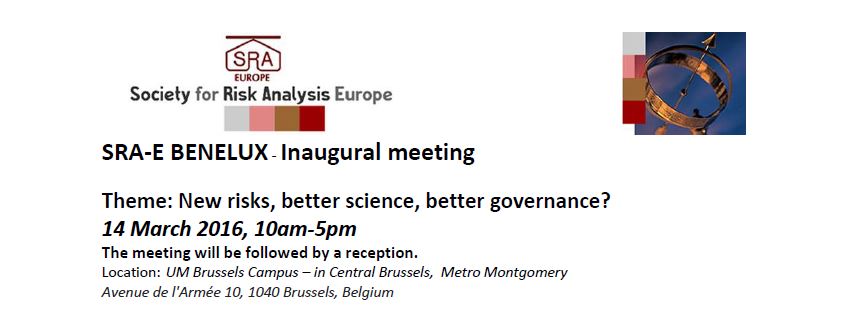The first meeting of SRA-E Benelux "New risks, better science, better governance?" was held on 14 March 2016 at the UM Campus Brussels.
Due to their topography, high population density and high level of industrialisation the Benelux countries stand out in Europe as a region exposed to numerous hazards that may impact on health and the environment. Experience of harm – from flooding to food contamination, from industrial disasters or zoonoses- has stimulated outstanding research in risk analysis as well as innovative management approaches. Although some risks are well known and managed, others are emerging and puzzling, requiring special attention and call for improvements.
Due to their high degree of spatial and economic integration in the World Economy Benelux countries are particularly vulnerable to emerging systemic risks, from the knock-on effects of coastal flooding to the spreading of diseases. Some of these risks may be so large (both spatially and in time) that they require integrated scientific input, concerted efforts to tackle their consequences as well as appropriate governance structures to organise multi-stakeholder input.
The complex and ambiguous nature of many emerging risks combined with declining levels of trust in Science and Government suggest that disagreements can arise over how to best cope with systemic risks and who will be responsible when things go wrong. In this category the amount of social trust in organised or formalised decisionmaking will be one of the major risk factors that may emerge in the next few years.
Given this scope, the meeting aimed to bring together individuals and organisations interested in risk assessment, risk management and risk communication in Belgium, The Netherlands and Luxembourg.
Highlights of the SRA-E Benelux inaugural meeting
For our first meeting we had about 40 participants mainly from Academia, Government and Industry. Active participation took place at plenaries and 3 parallel sessions. The meeting had a strong policy focus with a keynote presentation from the Chief Vet of the Netherlands, Christianne Bruschke, as well as the Ministry of Infrastructure and the Environment presenting their risk approach, many thanks to all speakers.
One theme that emerged was the need to look more thoroughly into the notion of Uncertainty from legal, psychological and governance perspectives. Conventional risk analysis has sometimes neglected the concept, which is an issue. Equally, the tendency to ''hype'' uncertainties is a challenge to balanced decisions about risks. Another crucial outcome of the meeting is the recognition that education plays a role and that introducing students to cognitive research outcome can help improve the quality of decisions.
Thanks to Randa Kachef there is a great photo album which you can find by clicking here.
It is also our pleasure to announce that RIVM has offered to host our next annual meeting on 20 March 2017. Many thanks to them!
Ideas and suggestions about events and funding are much welcome too.
Further information on the meeting can be found below:
Keynote speakers:
- Christianne Bruschke, Ministry of Economic Affairs, The Netherlands
Emerging risks, new challenges for science informed decisions
- Monique Bosman, Ministry of Infrastructure and Environment, the Netherlands
Explicitly Considering Safety
- Rob Geerts, AVIV, the Netherlands
Uncertainty: the practical problem of meta risk communication
- Michael Faure, Maastricht University, the Netherlands
Judge versus regulator in the regulation of uncertain risk
- Tom Jansen, National Institute for Public Health and the Environment (RIVM), the Netherlands
What is an uncertain risk? A systematic conceptual review of the environmental health literature
- Marijn Poortvliet, Wageningen University, the Netherlands
The psychology of uncertainty: implications for regulatory preferences and trust in institutions
The full meeting programme can be found HERE.
The meeting invitation/call for abstracts can be found HERE.











